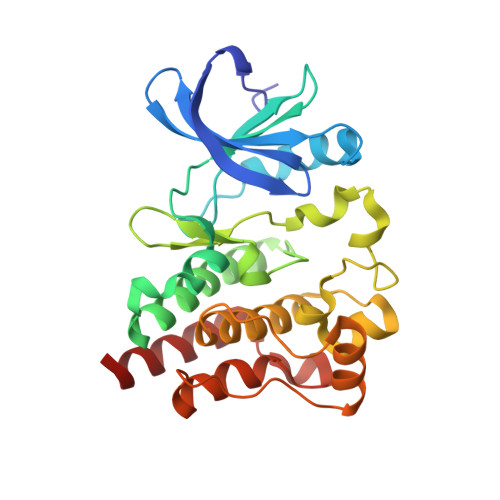Discovery of Zanubrutinib (BGB-3111), a Novel, Potent, and Selective Covalent Inhibitor of Bruton's Tyrosine Kinase.
Guo, Y., Liu, Y., Hu, N., Yu, D., Zhou, C., Shi, G., Zhang, B., Wei, M., Liu, J., Luo, L., Tang, Z., Song, H., Guo, Y., Liu, X., Su, D., Zhang, S., Song, X., Zhou, X., Hong, Y., Chen, S., Cheng, Z., Young, S., Wei, Q., Wang, H., Wang, Q., Lv, L., Wang, F., Xu, H., Sun, H., Xing, H., Li, N., Zhang, W., Wang, Z., Liu, G., Sun, Z., Zhou, D., Li, W., Liu, L., Wang, L., Wang, Z.(2019) J Med Chem 62: 7923-7940
- PubMed: 31381333
- DOI: https://doi.org/10.1021/acs.jmedchem.9b00687
- Primary Citation of Related Structures:
6J6M - PubMed Abstract:
Aberrant activation of Bruton's tyrosine kinase (BTK) plays an important role in pathogenesis of B-cell lymphomas, suggesting that inhibition of BTK is useful in the treatment of hematological malignancies. The discovery of a more selective on-target covalent BTK inhibitor is of high value. Herein, we disclose the discovery and preclinical characterization of a potent, selective, and irreversible BTK inhibitor as our clinical candidate by using in vitro potency, selectivity, pharmacokinetics (PK), and in vivo pharmacodynamic for prioritizing compounds. Compound BGB-3111 ( 31a , Zanubrutinib) demonstrates (i) potent activity against BTK and excellent selectivity over other TEC, EGFR and Src family kinases, (ii) desirable ADME, excellent in vivo pharmacodynamic in mice and efficacy in OCI-LY10 xenograft models.


















